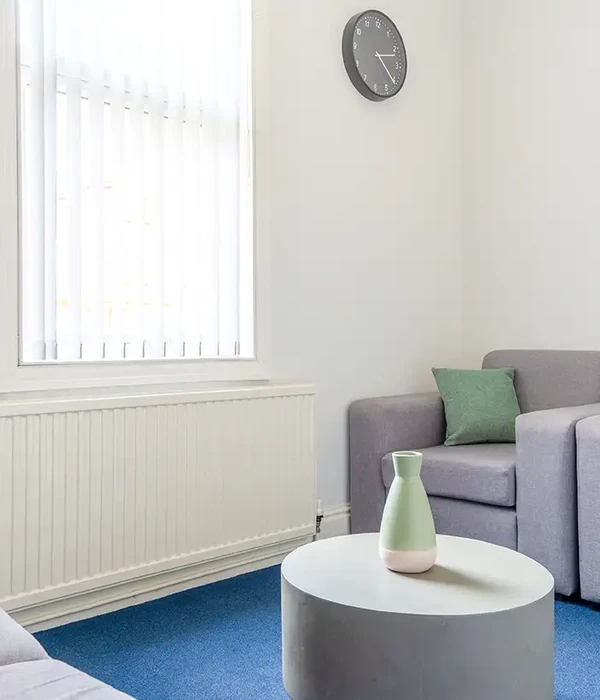Outpatient Mental Health Treatment
Outpatient mental health treatment gives you help for mental health issues without staying overnight in a hospital. You can get support for mental health conditions like depression, anxiety, stress, and more through regular visits to a clinic. They can be just as effective as an inpatient treatment programme.
Outpatient approaches are often best if you need ongoing support but do not require round-the-clock supervision. In contrast to inpatient care, outpatient treatment offers a flexible approach to receiving professional care while maintaining your normal routine.

Take the First Step Towards Recovery
Steps Together offers personalised support and proven treatments, providing the care, guidance and encouragement you need to move forward with confidence and build a healthier future.

What Is Outpatient Mental Health Treatment?
Outpatient mental health treatment supports individuals in managing emotional and psychological challenges such as burnout, while continuing to live at home and engage in daily responsibilities.
It offers access to a range of therapeutic services so patients can receive treatment and maintain their daily routines. Outpatient treatment plans can be an effective option for building coping strategies, improving mental well-being, and maintaining stability in everyday life.
Features of Outpatient Care
Outpatient treatment involves supporting your behavioural health treatment needs without an inpatient setting. You attend scheduled sessions at a clinic, therapist’s office, an outpatient facility, or even go to an inpatient facility for the day and leave at night.
You can participate in various therapies, including individual therapy, group therapy, and family therapy. Some sessions might include psychiatric services and medication management. The care is flexible and can be arranged to accommodate your work, school, or family commitments.


Differences Between Outpatient and Inpatient Treatment
Inpatient and outpatient services differ in a few key ways. In outpatient care, you live at home and attend appointments on specific days, typically a few times a week. With inpatient treatment, you stay at a hospital or residential treatment facility.
Inpatient treatment is usually for more severe cases or when safety is a concern. Outpatient treatment is suitable if your mental health symptoms are stable and you do not need constant supervision.
Conditions Treated in an Outpatient Programme
Outpatient mental health treatment helps you manage a range of specific mental health disorders, such as depression, anxiety, trauma, substance use, or eating difficulties.
Mood Disorders
Mood disorders include conditions like depression and bipolar disorder . If you have depression, you may feel sad or empty for most of the day, lose interest in things you once enjoyed, and struggle with sleep or eating. Outpatient care often uses talking therapies, medication management, and sometimes group support to help you cope with symptoms.
Treatment in an outpatient programme helps you learn how to manage symptoms, spot warning signs, and prevent relapses. You are likely to meet with your mental health team regularly to adjust your care as needed.
Trauma-Related Disorders
Trauma-related disorders, such as post-traumatic stress disorder (PTSD ), develop after you experience or witness a distressing event. Symptoms can include flashbacks, nightmares, avoidance, and feeling constantly on edge.
In outpatient settings, you might receive trauma-focused therapies like eye movement desensitisation and reprocessing (EMDR) or specialised CBT. These approaches help you process difficult memories safely while learning tools to regain control of your thoughts and emotions.
Anxiety Disorders
Anxiety disorders such as generalised anxiety disorder, social anxiety, panic disorder, and specific phobias. Symptoms include frequent worry, nervousness, or sudden feelings of fear and panic. You may also experience physical symptoms, such as shaking, sweating, or a racing heart.
With outpatient treatment, you can access evidence-based mental health treatment options such as CBT, exposure therapy, and anxiety management skills. Therapists work with you to change harmful thought patterns and help you build new, healthy coping mechanisms.
Substance Use and Eating Disorders
Substance use disorders involve problems with alcohol, drugs, or prescription medication. Symptoms might include cravings, loss of control, and difficulty meeting responsibilities. Eating disorders such as anorexia, bulimia, or binge eating disorder cause unhealthy habits with food, weight, or body image.
Outpatient care offers individual therapy, group counselling, and sometimes family involvement to help you set goals and develop new habits. Treatment helps you understand the roots of your substance use or problematic eating behaviours and builds practical strategies for making changes.
Services that our multi-speciality addiction rehabilitation centres offer
Outpatient Treatment Detox
Outpatient Treatment Detox

Outpatient Therapy Approaches
Outpatient mental health treatment offers a variety of evidence-based therapies designed to meet individual needs. These therapeutic approaches typically include structured sessions with a licensed therapist, where you can explore thoughts, emotions, and behaviours in a supportive environment.
Options such as CBT and DBT can help you develop practical skills to manage stress, anxiety, depression, and more. Outpatient care provides the flexibility to apply what you learn directly to your daily life.
Behavioural Therapies
Cognitive Behavioural Therapy helps you identify and change negative patterns of thinking and behaviour. During sessions, you will learn to recognise unhelpful thoughts and challenge them with evidence and logical reasoning. CBT often uses homework, such as keeping thought records or practising new skills outside of therapy.
Dialectical Behaviour Therapy (DBT) builds on CBT but focuses more on managing intense emotions and improving relationships. If you deal with mood swings, self-harming, or impulsive behaviour, DBT may be right for you. Mindfulness and practical exercises are common in DBT, helping you learn how to calm your body and mind.

Benefits of Outpatient Mental Health Treatment
One of the key advantages of outpatient mental health treatment is its flexibility. You can schedule your therapy sessions around work, school, or family commitments, allowing you to stay productive while prioritising your well-being. Outpatient sessions typically occur at scheduled times during the week, allowing you to plan and avoid disrupting your responsibilities.
Outpatient treatment allows you to get support while staying in your own home. Being in a familiar environment can reduce stress and increase comfort, making it easier to use coping techniques learned in therapy. With outpatient care, you can involve family members or close friends in your treatment, so they understand how to help you during recovery.
Choosing outpatient treatment may open the door to a range of local community resources. You can receive referrals for group therapies, skills workshops, employment services, and volunteer opportunities while in recovery. Many outpatient programmes work closely with community organisations, linking you to services that meet your specific needs.
Types of Outpatient Treatment
Outpatient mental health services encompass various approaches tailored to your specific needs. The types of therapy that can be used in outpatient care are diverse and they can include:
Individual Therapy
Individual therapy lets you work privately with a qualified therapist. In these therapy sessions, you discuss things that trouble you, learn new coping strategies, and set personal goals. This approach is especially helpful if you want to discuss sensitive problems or need tailored support.
You may attend once a week or more, depending on your situation. Each session typically lasts about 45-60 minutes. Your therapist uses proven techniques to help you handle issues like anxiety, depression, trauma, or stress.
Medication Management
Medication management is a key service if you take medicines for conditions like depression, bipolar disorder, or schizophrenia. Psychiatrists or other medical professionals review the medicines you are taking and make adjustments as needed.
Regular appointments help monitor your symptoms, manage side effects, and ensure your medicine is working effectively for you. These sessions focus on education, discussing any concerns, and supporting you in taking your medicine as prescribed.
Group Therapy
Group therapy brings together several people facing similar challenges. In a group setting, you share your experiences and learn from the feedback of the group. Group therapies work well alongside individual counselling and help you practise new social and coping skills in a real-world setting.
A trained therapist leads the group and keeps conversations safe and focused. Sessions might centre on topics like stress management, coping with loss, or substance misuse recovery.

Outpatient Treatment Options Can Heal You
Addiction and mental health challenges can disrupt your life, but you can find treatment that fits your schedule. Outpatient mental health care offers practical services that allow you to manage conditions like anxiety and depression while living at home.
Outpatient mental health treatment is available from medical professionals, community teams, and private providers like Steps Together, and a variety of therapy options are proven to be effective. Overcoming your concerns doesn’t require you to live in a treatment facility.
Frequently Asked Questions
What services are typically provided by outpatient mental health facilities?
You can access therapy sessions, psychiatric assessments, medication management, and group programmes. Services often treat anxiety, depression, bipolar disorder, or schizophrenia.
What is the process for booking an appointment with a General Practitioner for mental health concerns?
To book an appointment, contact your GP practice by phone, online, or in person. Let the receptionist know if your problem is related to your mental health.
In what ways do Community Mental Health Teams support individuals with mental health issues?
Community Mental Health Teams (CMHTs) offer care for people with moderate to severe mental health problems. They include nurses, psychologists, occupational therapists, and social workers.
How can an individual identify the need for professional mental health support?
You may need help from a mental health professional if you notice constant low mood, high levels of anxiety, or changes in eating and sleeping patterns. Struggling to cope with daily life, losing interest in activities, or feeling hopeless are also signs.
How can someone receive a mental health diagnosis through private healthcare routes in the UK?
You can book a private assessment directly with a mental health clinic or psychiatrist without a GP referral. Many clinics offer online booking and have shorter wait times than NHS services.
What treatments are considered most effective in outpatient mental health care?
Talking therapies such as cognitive behavioural therapy, medication, and psychoeducation are widely used. Group therapy and support groups can also help. Outpatient clinics use methods supported by research to help you manage your mental health effectively.





